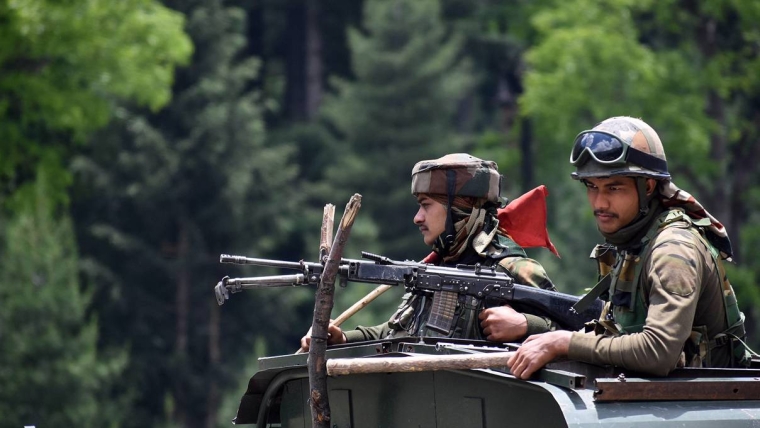
The ongoing standoff between Chinese and Indian forces along the two countries’ disputed Himalayan border recently resulted in the first troop casualties there in decades, with some Indian soldiers killed in particularly brutal fashion. Moreover, the intensity of China’s multiple cross-border incursions suggests approval from the highest levels of the Chinese government.
Satellite pictures confirm that Chinese forces have occupied at least 60 square kilometers (23.2 square miles) of territory that India claims as its own. Indian Prime Minister Narendra Modi’s government has downplayed this uncomfortable reality, perhaps out of concern that publicly acknowledging the truth would inflame domestic public opinion and fuel a highly undesirable escalation of tensions. A less benign interpretation, however, is that the government is embarrassed, because its claim to be more muscular than its predecessor in confronting external aggression has been proven hollow.
But China’s recent saber-rattling may paradoxically benefit India by jolting it out of one of its periodic stupors. After its disastrous 1962 war with China, for example, India undertook a sweeping modernization of its military and subsequently won a decisive victory in the 1971 Indo-Pakistani War.
Similarly, after its own misguided economic policies raised the specter of mass starvation in 1966-67, India launched the “Green Revolution,” and today has nearly 100 million tons of grain stocks. And, following its massive balance-of-payments crisis in 1989-91, India initiated a historic economic liberalization program that ushered in a quarter-century of unprecedentedly rapid growth.
In each case, a crisis served as a kick in the pants. China has now delivered another. The Communist Party of China has been adept at leveraging the country’s humiliation at the hands of foreign powers in the nineteenth century to drive domestic change while preserving its own political monopoly. But the CPC’s recent aggressive behavior toward India mimics that of China’s former imperial masters – and will likely have similar consequences.
First, China’s show of force will set back its relations with India by decades. Since the turn of the century, Indian policymakers have wrung their hands over how to handle China’s extraordinary rise. They are well aware of how China has sought to stymie India, whether by offering neighboring Pakistan carte blanche regarding cross-border terrorism, blocking India in different international fora, or making strategic inroads in its neighborhood. But Indian governments, recognizing their country’s weakness, have been loath to poke the dragon with which it shares a border more than 4,000 kilometers (2,485 miles) long.
India will now be less inhibited about deepening ties with the other three members of the so-called “Quad” (Australia, Japan, and the United States) and more forcefully embracing the “Indo-Pacific” concept. Furthermore, it will be increasingly wary of participating in Chinese-led multilateral fora, and, where possible, will seek to hinder China’s efforts to establish a Sinosphere.
Second, it has become abundantly clear that India’s military inferiority to China reflects a widening economic gap. The previous Indian government, under Prime Minister Manmohan Singh, raised the economy to new heights in its first term (2004-09), and lowered it to new depths in its second (2009-14). But, under Modi, India’s economy has been spinning its wheels, and reform has now become an existential necessity for national security.
Third, India will now accelerate military changes. Although Modi’s government loves to talk tough, military expenditures have declined from 2.9% of GDP in 2009 to 2.4% last year.
Moreover, the government’s populist policy of sharply raising army pensions has meant that India’s defense budget this year allocated more money to military retirement benefits than to army salaries. Indeed, defense pensions as a share of non-pension defense spending has quadrupled, from less than 10% in the late 1980s to over 40% this year. And with salaries and pensions accounting for nearly three-fifths of Indian defense spending, there is little left to invest in modernization. Whereas China spends more than two-fifths of its defense budget on modernization, and Pakistan more than one-third, the share in India’s case is barely one-quarter.
Finally, while Modi’s ruling party has polarized Indian society around religion, China has now inadvertently supplied the glue to bind Indians together – if only in shared hostility. Chinese President Xi Jinping seems to have a unique ability in that regard. For example, Australians’ trust in China has fallen to its lowest ever level. Australia, as much as any Western country, had previously sought strong ties with China. But when the Australian government called earlier this year for an independent inquiry into the origins of COVID-19, China retaliated by blocking Australian imports, underscoring the degree to which it is now using economic coercion against its critics.
Likewise, a Pew Research Center survey in March found that a record 66% of Americans had an unfavorable view of China. And China’s aggressive stance toward Hong Kong ensured that incumbent Taiwanese President Tsai Ing-wen comfortably won re-election in January, after the opposition Kuomintang had seemed poised to win on a platform of closer economic links with China.
Of course, India being India, there will be no seismic changes. But the country’s foreign policy and the direction of its economic and military reforms will increasingly reflect the challenge posed by China, which Indians now regard as their principal enemy. Ironically, as India seeks to escape China’s shadow, it will have its powerful neighbor to thank for finally triggering changes that should have happened long ago.
Devesh Kapur is Director of Asia Programs and Professor of South Asian Studies at Johns Hopkins University’s Paul H. Nitze School of Advanced International Studies. This content is © Project Syndicate, 2020, and is here with permission.
8 Comments
not just the indian defence force that is muscling up,Australia is updating with new missiles and we should be getting some teeth too as China will be picking on us next if the blue team dont get elected.
I think the author is right - President for life Xi has awoken a tiger.
Whether it is a tiger that can fight will depend on India getting economic growth moving. A wealthier India would give NZ a second major customer after China. I would be happy to see NZ and India moving closer - we have more than just cricket in common.
India has a huge army. Within that there are special forces. These should be deployed, discreetly but nevertheless at the ready, along the current border hot spots. Concurrently soldiers of potential should be selected and commence training to significantly bolster the ranks of said special forces. In less palatable terminology, these in the past, WW1 Germany for instance, have been known as storm troopers.
The author describes a condition and failing of politicians the world over; that of self belief in their omniscience. that they know it all. But complacency comes with very sharp teeth. Helen Clark gutted our military when she killed the strike wing of the RNZAF. While at the time such a move was simple, the consequences are extreme, and in a world of increasing turmoil and tension, more than ever in our history are we reliant on allies, and less capable than ever of being able to deliver in our own defence.
It would take at least five years to reactivate a strike wing with a modern, long reaching strike capability, and significant expenditure, before we could significantly contribute to our own defence. After a Government makes that decision, and until then we are nothing more than a target.
Good luck getting that one past the Greens, remember the fit Golriz had when we ordered the P-8 Poseidons because they could find submarines better than the P-3s? Imagine the response if we tried to buy something with guns on it.
Perhaps she shoud be reminded of Pastor Martin Niemoller's words? The only people and countries safe from attack and invasion these days are the ones with an effective military. It is too late to consider it when they're knocking at the door.
Aye, there it is. Go tell the Belgiums.10 May 1940.
India is going to have to spend more on healthcare following the Corona outbreak spiralling there now.
Won't be much left for increasing defence spending. Also Modi is not that firm in the saddle today. He is now seen as more of a preacher than a doer.
Having said that, the Chinese threat to the world is purely a product of American manufacturing, for political purposes. Especially Trump blowing steam to energise his base for the November elections.
Then also, China is not keen to have a protracted land war and neither does India. Both will settle this slowly and away from the spotlight.
So, not expecting any drastic change in course in India or China.
China is more concerned with Hongkong and Taiwan and South China Seas.
It knows that India is not a threat and there is no upside in a tussle with India.

We welcome your comments below. If you are not already registered, please register to comment
Remember we welcome robust, respectful and insightful debate. We don't welcome abusive or defamatory comments and will de-register those repeatedly making such comments. Our current comment policy is here.